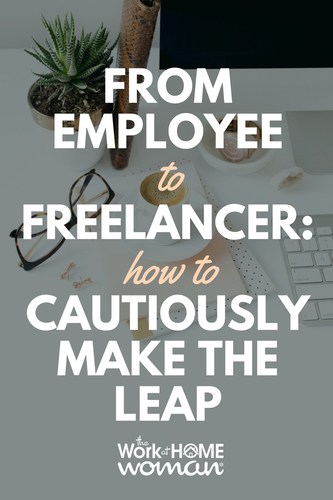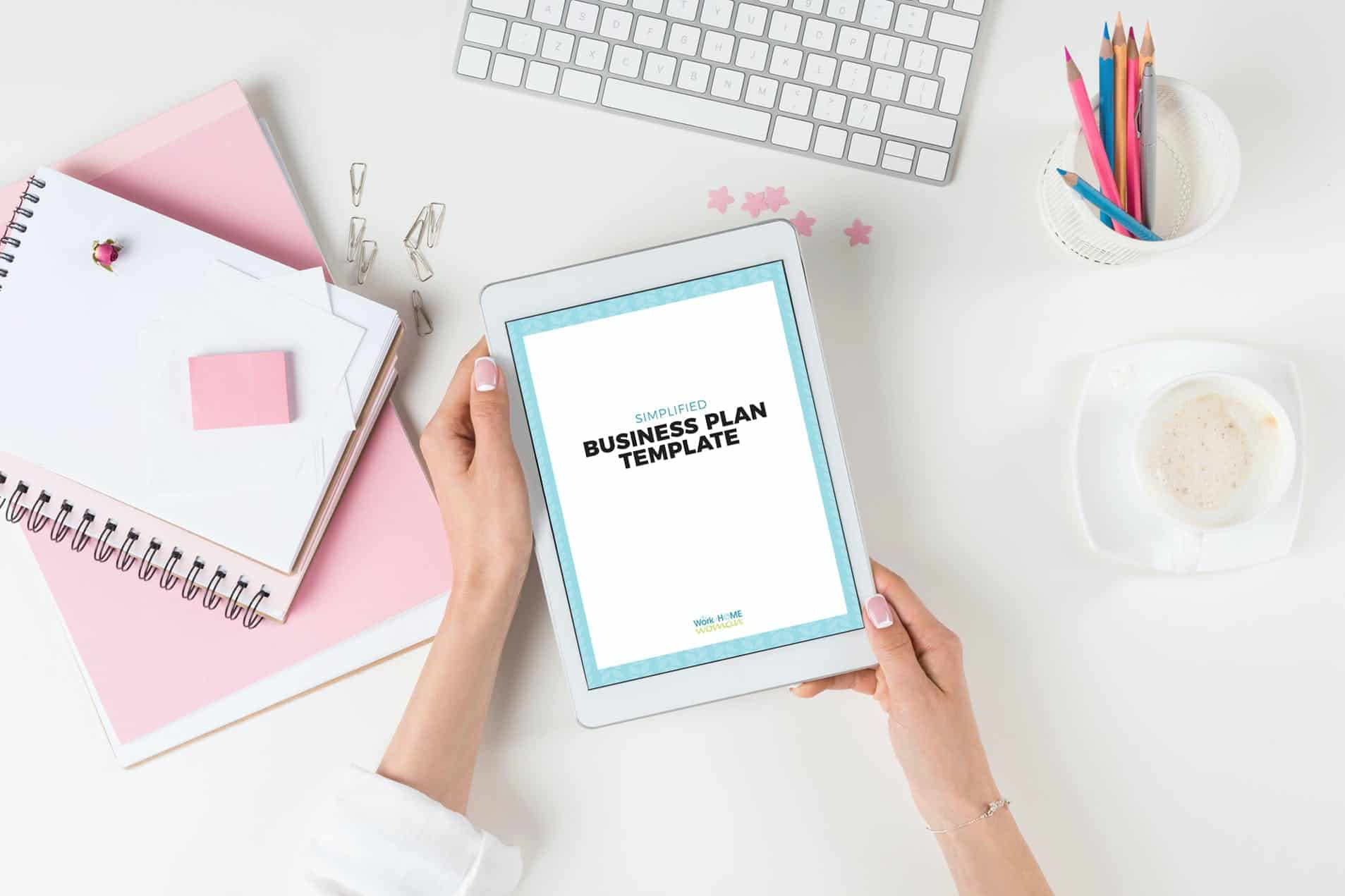 Today we’re tackling a freelance question from one of our readers:
Today we’re tackling a freelance question from one of our readers:
Hi Holly,
At the beginning of the year, I will be making a huge switch from my full-time position to freelance in order to get rid of my long commute and be closer to home and my two-year-old. To say I am nervous about the transition is an understatement. Do you or your readers have any tips? Freelance is a new venture for me and brings tons of anxieties around benefits, 401K, how to withhold for taxes, ahhh!
Thank you in advance for any suggestions, Rebecca
Hi Rebecca,
I know what you mean about anxiety and fear! It took me many months to get all my ducks in a row before I felt confident in launching my business. Even then I still made mistakes along the way. But with a little pre-planning and the right tools, you’ll be prepared to handle whatever comes your way.
Here’s how to make the leap from employee to freelancer.
1. What’s Your Plan?
You may be the best freelancer in the world, but without a solid plan to market and sell your services, that’s all you have is a skill. Thoroughly research your niche and make sure that there’s a market for your services. Write up your business plan and make sure that your idea can generate an income that meets your lifestyle needs.
2. Do You Have Health Insurance?
Before you give up your existing coverage, you’ll need to have a plan for getting coverage, whether it’s through your spouse’s plan, COBRA, or another provider. This is one area where I was lucky because I was able to get on my husband’s insurance plan without any wait or issues.
If you need to look for a new provider try looking at Healthcare.gov, HealthSherpa, GetInsured, Medi-Share, or GoHealthInsurance.com on these sites you can add your age, income, and family members to get quotes from various companies. On a couple of the sites, I was able to find coverage for around $200 a month for myself. If your income is low enough, you and your kids may qualify for Medicaid or the Children’s Health Insurance Program.
3. Do You Have a Retirement Plan?
When I switched from employee to entrepreneur, I was totally clueless about what to do with my existing 401K and how to plan for my future. Luckily, my husband and I were able to come up with a plan that works well for us as a family.
First, you’ll probably want to roll over your existing 401K into an IRA (Individual Retirement Account), SEP IRA (Simplified Employee Pension) or a Solo 401K, so that you can continue to contribute to your retirement plan. Each type of account has its own pros and cons, so meeting with a financial planner can take a lot of the guesswork out of the process. I was able to meet with one at my bank branch. It took a couple of meetings to get the paperwork filled out, filed, and the account setup, but once everything was in place it’s been little to no maintenance to keep up.
If you need more tips for preparing for retirement when you have unpredictable income — check out this article!
4. Have You Thought About Your Taxes?
When I started my business, I knew I had to keep track of my income and expenses, so I used a spreadsheet to record everything. While this worked (kind of) it made tax time a huge hassle. Nothing was categorized correctly, and I had to jump in between tables to locate all of the information that I needed. Not only that, but I had no idea that self-employed individuals needed to pay quarterly taxes, so I was hit with a tax penalty — ouch!
While it can be tempting to save a few dollars on expenses, don’t scrimp when it comes to managing your finances. Using a spreadsheet to track your income and expenditures is not only time consuming and segmented, but it also doesn’t calculate how much you owe in quarterly self-employment taxes. Use a simple online accounting system like Quickbooks to help automate, organize, and track your finances. Not only will this make your bookkeeping easier, but it saves you time and headaches when tax time rolls around.
5. What’s Your Business Structure Going to Be?
The second part of your tax equation will depend on your business structure. As a freelancer, you can choose to run your business as a Sole Proprietor, General Partnership, Corporation, or a Limited Liability Company (LLC). Again each one has its pros and cons and meeting with an attorney or an accountant can take the guesswork out of which is best for you.
It’s easiest to get started as a Sole Proprietor because you don’t need to have a separate business bank account or an Employee Identification Number (EIN), but I would recommend setting both of these items up. Another item to consider is when you’re working as a Sole Proprietor your personal property and your business are considered one, which could be problematic if your business is sued or has bad debt. Forming an LLC provides a buffer between your personal property and your business.

6. How Will You Stay Organized?
It’s easy when you first start out to manage your clients “in your head“ or by using a simple calendar. But once business starts to pick up and you have multiple clients, it becomes very difficult to remember what needs to be done, and when. One of the easiest ways to manage and run your freelance business is by utilizing Customer Relationship Management (CRM) software. CRM software allows you to organize, automate, collaborate, notify, gather data, and track your freelance projects all in one place — which simplifies and streamlines your business. And there is no reason to worry about price — Trello is not only easy to use, but it’s totally free and can be used on both your desktop and smartphone.
7. Do You Have Peace of Mind?
One of the biggest stressors for new freelancers is lack of money. Unless you’ve started moonlighting (taking clients at night while you’re still at your current job) you’ll probably be starting out from scratch — no clients and no income. To help alleviate some of this financial stress, it’s wise to have an emergency fund. Experts usually suggest having six months’ worth of essential living expenses (rent, food, utilities, etc) in your savings account. During this time you’ll also want to modify your budget to cut out non-essential spending while you’re ramping up your business. You may also consider doing some side tasks to bring in a little extra money.
8. Do You Have the Right Mindset?
Being a freelancer requires a lot of hard work, persistence, and dedication, but along with this, you need to have a positive mindset. Every freelancer goes through their fair share of ups and downs, but what differentiates the successful ones from the unsuccessful one, is a positive, “I’m going to make it” attitude. Is fear and self-doubt getting the best of you? As they say, fake it until you make it. What this means is that you need to redirect those negative thoughts and replace them with positive ones.
9. Have You Found a Tribe?
Making the switch from employee to freelancer requires a huge change in your mindset. But not only that, you’ll need people who understand your new world; which often your spouse, family, and friends don’t quite understand because they work in a traditional work setting. Be sure to find groups, organizations, and like-minded freelancers to connect and network with. Your tribe will be invaluable when you have questions, need advice, or just someone to vent to. This post here talks about where to find your freelance tribe.
10. What’s Your Plan for Keeping Up with Technology and Trends?
With technology and marketing practices constantly changing, it is imperative that you reinvest in yourself by furthering your education. This doesn’t have to be a formal class, activities as simple as reading a new business book each month, attending a free webinar or teleconference or attending an industry-related event or conference will help you to stay on top of your game.
Conclusion
Making the leap from employee to a freelancer can be a scary endeavor, but once you start planning and executing your dream, you’ll become more at ease with the process and lifestyle. Just keep placing one foot in front of the other, and whatever you do, don’t give up. You got this!
Are you thinking about transitioning from employee to freelancer? If so, what questions and concerns do have? Drop us a note; we’d love to hear from you!







Making a checklist out of your post. Though I’m already freelancer for quite a while now, but I still haven’t organized everything. Thanks for advice!
Glad you enjoyed the tips, Jen!